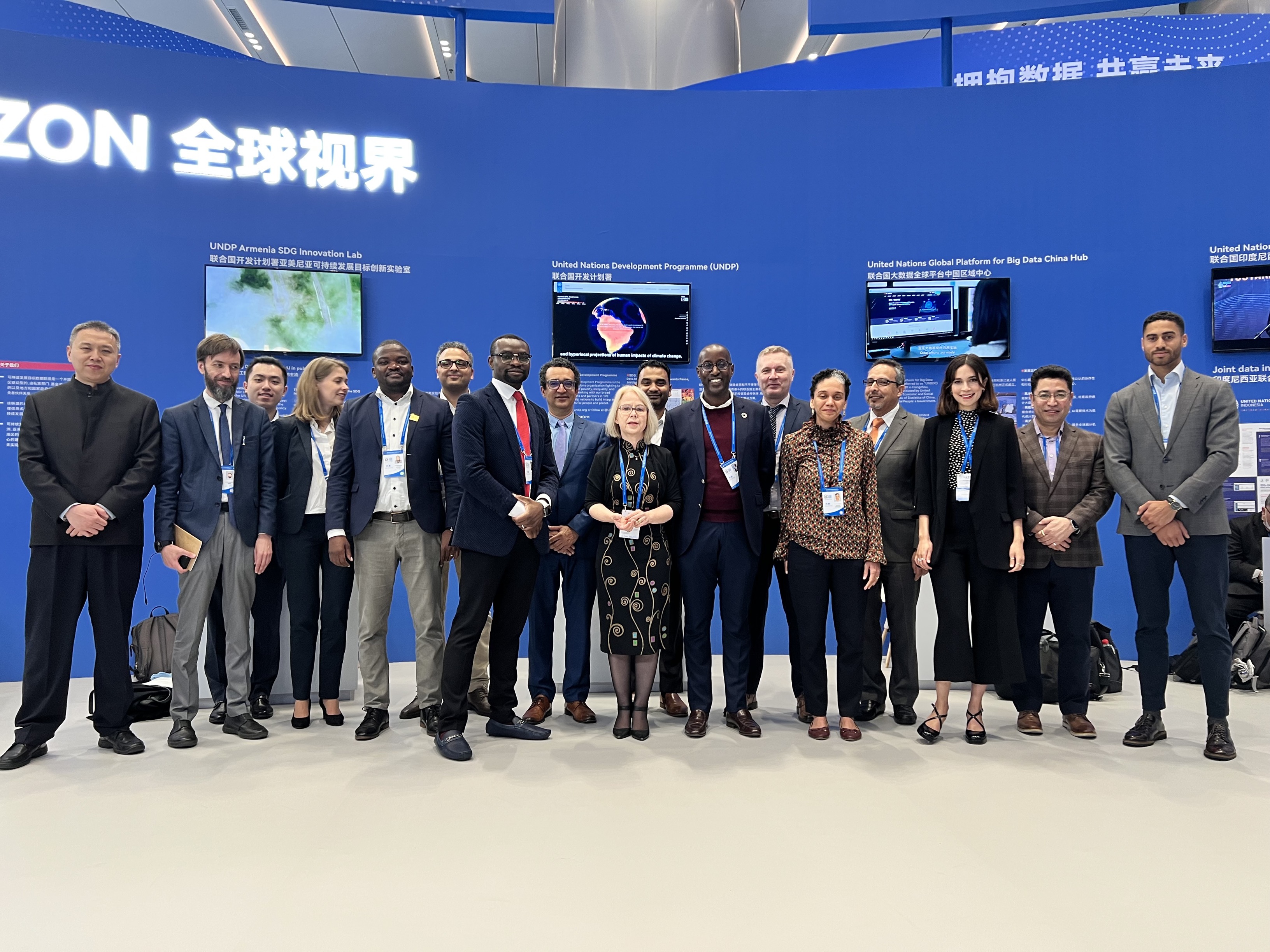The three 'Cs' of sustainable development data
June 29, 2023

UNDP team at the UN World Data Forum.
Sherlock Holmes’ creator Sir Arthur Conan Doyle once wrote that, “It is a capital mistake to theorize before one has data”. This is even more true in the world of polycrisis and complexity. That’s one of the reasons why the UN organizes its World Data Forum annually since 2017 to spur innovation, nurture partnerships, mobilize high-level political and financial support for data, and build a pathway to better data for sustainable development.
This year’s forum took place in Hangzhou, China with the participation of over 11,000 people. For our UNDP team who took part in organizing and attending the 3-day event, the key takeaways for addressing data and development challenges comes down to collection, coordination, and collaboration.
"The multitude of crises that confront us must be a wake-up call for immediate and concerted global action. In responding to it, leveraging data to its full potential is indispensable in learning from our mistakes of the past, and chart a new, more sustainable course forward.” - Beate Trankmann, UNDP Resident Representative in China, and the head of UNDP’s delegation
Collection
Data should be collected from a variety of sources to ensure that decisions are based on the best data available to inform decision-making. In complex contexts such as Syria, data collection is a crucial tool for understanding and addressing the challenges faced by affected communities. One of the main ways it is being collected is from citizen-generated data through social media, where people use these platforms to document their experience, challenges, and needs. Satellite imagery is also used to assess damage to infrastructure and migration movements, while official reports can be used to extract valuable insight for interventions on the ground.
Although technology can help drive the collection of development data from a variety of sources, it’s also important to take stock of the opportunities and risks of using public and private sources, the methodology behind data collection, as well as the impacts on privacy. It’s equally important to have the people who understand how to analyze and extract valuable insight to help drive change.
“It was interesting to hear about the use of citizen's generated data and how countries like Ghana and Kenya are already operationalizing its use in filling existing data gaps in monitoring and reporting SDG indicators, as well as providing granular data for planning development initiatives.” – Anita Eyewane, UNDP Nigeria

It is crucial that different data types can talk to each other.
With more development actors using conventional and unconventional data sources, it is crucial that data is interoperable, in other words, that different data types can talk to each other. This also requires coordinating between data providers to capitalize on innovation and to amplify and leverage on each other’s work in pushing for sustainable development.
Related to coordination is integration. Complexity of development challenges requires multidimensional data that sits with governments, NGOs, development partners and partner UN agencies. To effectively do this, we also need systems that can handle the integration of data and analytics. Coordinating between actors, such as government, NGOs, and academia, to consolidate resources can help to break down silos, identify complementary activities, and ensure consistency and clarity on the work that goes behind generating data.
The Data Futures Platform is UNDP’s open resource and a one-stop-shop for data and analytical tools that uses problem diagnostics and the power of data to help governments and development practitioners understand complex issues and translate multidimensional data into actionable insights.
“One of the most pressing challenges related to data is ensuring that it’s accessible and usable by all stakeholders, including marginalized communities and developing countries, regardless of their technical expertise or resources. We also need to eliminate data silos and duplicating data processing time and costs.” – Inya Nlenanya, UNDP Bureau for Policy and Programme Support

The UN World Data Forum provided an opportunity to collaborate, and it created a space to discuss issues related to data governance, privacy, and literacy.
Collaboration
There’s no one-size-fits all solution to sustainable development data. To ensure we have better and more inclusive data to support decision-making, collaboration and partnerships are key.
The UN World Data Forum provided an opportunity for the international community to collaborate, and it created a space to discuss issues related to data, including data governance, data privacy, and data literacy. Yet it also highlighted the need for more partnership at both regional and national levels, as well as with the private sector and academic institutions. This also involves sharing knowledge and building capacity to use data for developing policy and designing development initiatives.
“Today, we see data being discussed at a political level and have come to understand the value of data as a strategic asset – key to making better decisions to support people and planet. We urgently need to invest in better data to ensure no one is left behind.” - Amina Mohammed UN Deputy Secretary-General
Data is everywhere and it can spur the world to be better by supporting a path towards sustainable development. We just need to harness its power through a simple mantra of collection, coordination, and collaboration.

This year’s forum took place in Hangzhou, China with more than 11,000 people.
Resources
- UN World Data Forum
- Hangzhou Declaration: Accelerating progress in the implementation of the Cape Town Global Action Plan (CTGAP) for Sustainable Development Data.
- UNDP: Mitigating data challenges is imperative for human development and getting the SDGs back on track
This blog was was originally published on UNDP’s SDG Integration website

 Locations
Locations